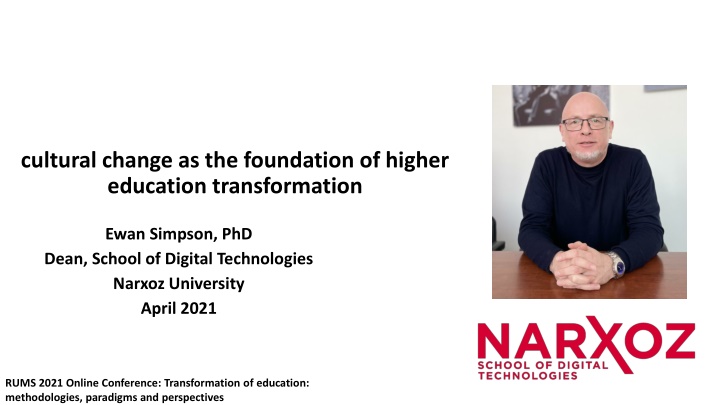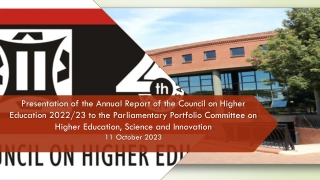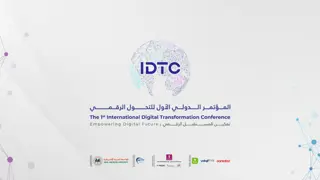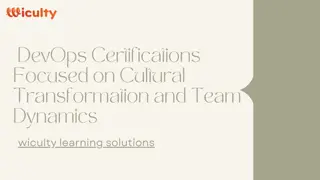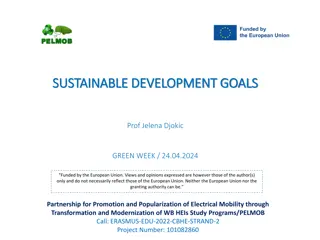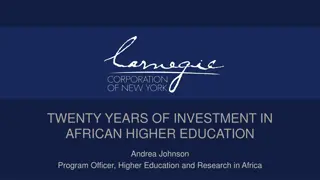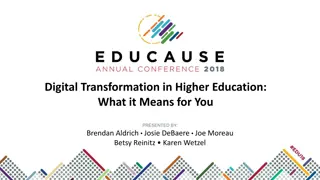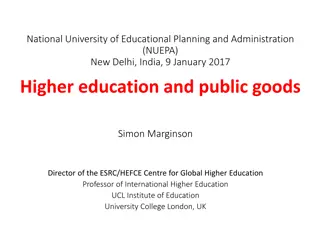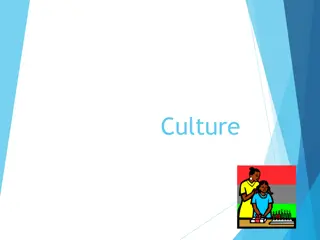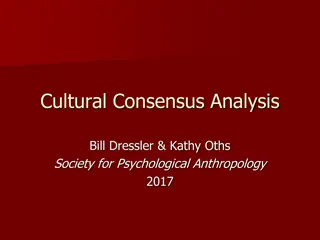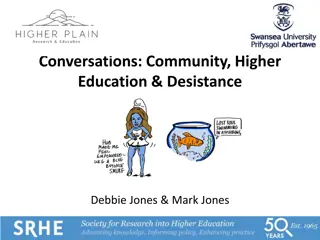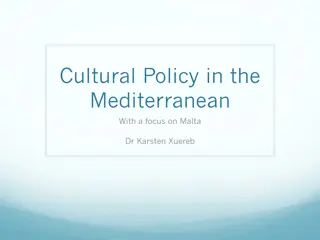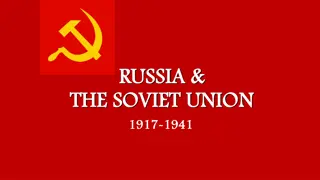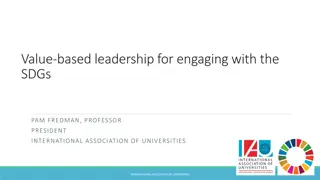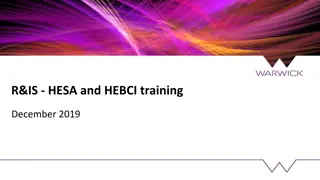Cultural Change in Higher Education Transformation
This discussion delves into the significance of cultural change as the bedrock for transforming higher education, focusing on key aspects like financial choices, faculty development, program relevance, and governance. Recommendations are provided to pave the way for authentic transformation in the sector.
Download Presentation

Please find below an Image/Link to download the presentation.
The content on the website is provided AS IS for your information and personal use only. It may not be sold, licensed, or shared on other websites without obtaining consent from the author.If you encounter any issues during the download, it is possible that the publisher has removed the file from their server.
You are allowed to download the files provided on this website for personal or commercial use, subject to the condition that they are used lawfully. All files are the property of their respective owners.
The content on the website is provided AS IS for your information and personal use only. It may not be sold, licensed, or shared on other websites without obtaining consent from the author.
E N D
Presentation Transcript
cultural change as the foundation of higher education transformation Ewan Simpson, PhD Dean, School of Digital Technologies Narxoz University April 2021 RUMS 2021 Online Conference: Transformation of education: methodologies, paradigms and perspectives
introduction introduction What are we really talking about when we talk about transforming higher education? Relevance? To whom? Quality? Who defines that? What do we want to transform higher education into? If we can t answer that we won t get very far We can assume that the goal is to be positioned organizationally to achieve international accreditation as a badge of international quality To have programs which are seen as relevant To produce research which is seen as relevant and publishable cultural change and governance are the foundation programs and research are the output Focus here is at the input and process level finances, culture, governance, faculty development Make some recommendations which could lead to a genuine transformation
contents contents defining transformation components of the process financial choices structural inefficiencies faculty program relevance culture and governance
what do we mean by transformation what do we mean by transformation a complete change in the appearance or character of something or someone, especially so that that thing or person is improved (Cambridge Dictionary) change improvement so transformation of education means changing education to improve it we are talking about the transformation of the sector, not a small number of elite institutions. Recommendation: clearly define what we mean by transformation
components of the process components of the process finance faculty programs students facilities and learning resources research the foundation for all of the above - culture and governance focus here on finance, faculty, programs, culture and governance
financial choices financial choices conventional wisdom is that if we spend more on something it will be better so is more money the answer? some context is important the majority of universities in Kazakhstan are private and get most of their funding from tuition fees average tuition fees are approximately one third of the official annual salary on the same measure, for example, UK university fees are one quarter of the average annual salary
financial choices financial choices in world leading education systems like the UK and USA, less than 50% of university income comes from direct tuition stage 1 is diversifying - and increasing - income If investment is part of the answer, tuition is already expensive when compared with income and accounts for a higher share of university revenue than world class systems
financial choices financial choices additional state support for core costs expanded corporate support greater success in attracting international funding over time build endowments the reality is that the state would be the main source - note that the OECD average public sector share for higher education expenditure is 68%, for the EU 73%. For the much admired Scandinavian countries, it ranges from 80-99% nothing wrong in that in that it is investment in a public good
financial choices financial choices Kazakhstan has made two critical choices to be a low direct taxation society and (historically at least) to invest less in higher education as a proportion of public spending than other countries. So priorities could shift if there was the will to invest without increasing overall spending if more money is the answer - for universities need to change the business model, since tuition is already expensive when compared with consumer incomes and accounts for a higher share of university revenue than world class systems Recommendation : Transformation cannot happen without revisiting financial priorities at state and university level
structural inefficiencies structural inefficiencies funds are limited even if they were to grow, does it make sense for Kazakhstan to have almost as many universities as the UK with less than one third of the population? not an argument for having less higher education, but an argument for efficiency of delivery even the most efficient universities have high indirect costs Recommendation 2: build a lean business model for a smaller number of larger universities which embrace quality online elements
faculty faculty if there was more money available, what should it be invested in? this is the heart of the matter and goes deep into understanding what drives the development of quality in universities the fundamental factor in transformation is the quality of the faculty developing and delivering education programs and carrying out research. infrastructure is politically acceptable Is investment in human capital equally so?
faculty faculty if we accept there is a need to transform the higher education system and that faculty are at the core of this process does it make sense to expect faculty the vast majority of who were trained in previous iterations of that same system to drive transformation without a major change? only three ways to change major investment in the professional development of the existing faculty recruitment of new faculty who are a better fit with the system transformation aims to develop retire those who are not able to transform
faculty faculty even if universities had additional funds, achieving this would demand a major reorientation of spending priorities inside universities to investment in intensive professional development (knowledge base and skills development) develop revised compensation systems to retain those trained (and the value of their training) by paying them more .and to attract new faculty who can contribute to the ongoing transformation of the system Recommendation: attract, invest in and retain high quality faculty
programs programs - - relevance relevance employers regularly complain about relevance and practicality what employers often mean is saving time and money on training, passing the costs to the state or the student there is a place for job specific skills, for example in IT, law and business, engineering and medical education these specifics can be dangerous without context and remember the Soviet education system was all about specialization
programs programs - - relevance relevance the employer voice is loud but often contradictory, since almost all surveys list non-profession specific qualities as the most desirable - critical thinking, flexibility, problem solving, independent thought and collaboration there is an argument to be made that being student-centered cannot just be about providing job-related training and knowledge but equipping students with skills and knowledge that will help them develop as people independent of a particular career path.
programs programs - - relevance relevance the reality is that many of the professions arguing for off the shelf graduates will employ far fewer people in future universities need to be focused on training for a future we don t know. what is relevant if we accept we don t have a crystal ball? perhaps the time has to come take a step back, be confident and make the case that education not directly related to specific current professions is also relevant and practical
programs programs - - relevance relevance educational leaders need to step up, make the argument and not contradict themselves (i.e. emphasize creative thinking vs. job ready) why waste time on skills and knowledge that will be redundant in a few years? How is that student centered? train students to understand how the world is as it is - how we got here, where we are and where we are headed, providing a context for the professionally-specific element.
programs programs - - relevance relevance develop this knowledge base while adopting learning techniques that build critical thinking, flexibility, problem solving, independent thought and collaboration Recommendation: be clear on what developing a modern relevant curriculum means
culture and governance culture and governance Building a culture and governance system is fundamental to success hire well and invest in faculty leave them alone to do what you hired them for It doesn't make sense to hire smart people and tell them what to do; we hire smart people so they can tell us what to do. (Steven Jobs)
culture and governance culture and governance most faculty will tell you they want to work in an environment where they ..are free to express themselves are involved in decisions that affect them ..have some say over what and how they teach..
culture and governance culture and governance ..are trusted by their managers to deliver well on what they are asked have interesting work colleagues have opportunities for professional and personal development both as teachers and researchers . ..have good students to work with. while compensation is important, this is not the only consideration.
culture and governance culture and governance current challenges have little to do with the intellectual potential of the people who work in universities witness the success of those who have left and experienced other university cultures in Kazakhstan and internationally but it has a lot to do with the culture of the universities in which they learned and now work
culture and governance culture and governance in many cases, these organizations do not provide a positive environment for growth and development as a result, they struggle to attract precisely the kind of people they need to be successful.
culture and governance culture and governance a top down command and control management does not work in a creative environment like a university people do nothing more than they are told since there is limited encouragement or reward universities cannot attract the best people because they are not investing in people, compensating them appropriately or crucially - providing an environment faculty will thrive in Recommendation: build a culture and governance system which is inclusive, democratic, faculty-led and based on mutual trust
the takeaway the takeaway Recommendation I : clearly define what we mean by transformation Recommendation II : transformation cannot happen without revisiting financial priorities at state and university level Recommendation III: attract, invest in and retain high quality faculty Recommendation IV: be clear on what developing a modern relevant curriculum means Recommendation V: build a culture and governance system which is inclusive, democratic, faculty-led and based on mutual trust
thanks for your time ewan.simpson@narxoz.kz
Draft notes Draft notes try to ffer an altenrative perspepctive think of structural rather than superficial issues Inputs rather than outputs beginning middle and end of transformation in higher education is the development of high quality faculty Basic argument Bolashak is the right approach, but nothing serious has of yet been put in place otproviude a platform for returning graduates to fully engage with higher education This is becyuase very little has been done to re-orient universities to where they should be Faculty driven - not th elow pay, low quality environment we find in most universities Moist of you don t want to her it because you are the status quo But I am also the status quo having been in KZ for almost 17 years and I can say that no university has succeeded in developing the kind of culture that will nurture a high quality faculty. Workloads are high, there is no encouragement or avenue for quality research, the command and control culture remains and involvement in governmenrac eis tokentic rubber stamping Comnpensaiton is low due to insane tuition levels and there is no way to build quality universities without attractinbg the right kind of people which cannot happen without a step change in income levels. The last 30 years have bene wasted in HE and the only way forward is to begin now to build an effective university culture. What might that look like The approach has been like investing in football players and doing nothing to improve facilities so they can succeed and expecting them to work for 10% of the income the people they learned with. .
